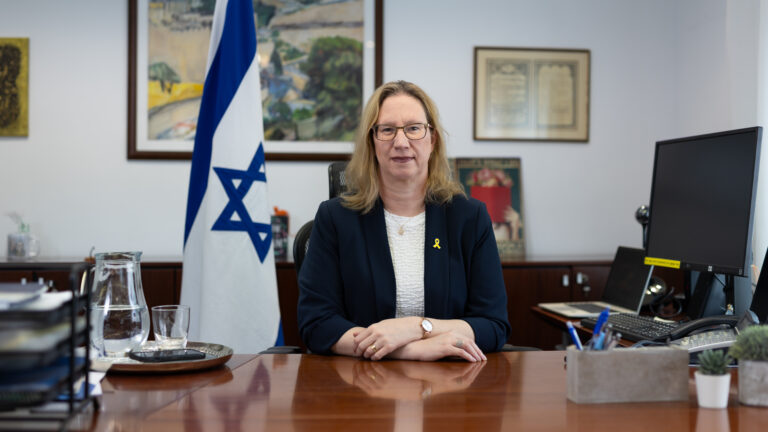In the decades after 1989, Hungarian governments tended to neglect the field of space research, despite the fact that Hungary’s contribution to the success of international space exploration and space activities was far from negligible. After 2018, however, the government committed itself to boosting Hungarian space-related efforts, as indicated by an increased budget dedicated to the field, as well as the establishment of a separate division responsible for space research and space activities within the Ministry of Foreign Affairs and Trade. On World Space Week we discussed trends in Hungarian and international space research with Dr Orsolya Ferencz, Ministerial Commissioner for Space Research.
Space, activities in space, and space travel have once again recaptured the interest of states, private individuals, and the wider public. What are the reasons for this? Can we talk about a new space race, or is it rather that the space race never really ended, and has merely received some extra momentum recently?
It never ended. Those who believed it had, are now in a worse situation, having lost their earlier positions. The Moon is a good example. In 2019 we marked the fiftieth anniversary of mankind’s first journey to the Moon, and next year it will be the fiftieth anniversary of the last Apollo mission. Since then, humanity has not returned to the Moon. Now we can see that China, India, Israel, the European Union, Russia, and of course the United States all want to go to the Moon again. The reason: they have come to recognize that the utilization of the Moon, its colonization, if you like, is important and significant for mankind in many different regards. If the United States had not halted the further development of its capabilities aimed at colonizing the Moon, we would currently be in a completely different situation. The co-called renaissance of space activities is not happening by accident. Over the last fifty years everything under the heading of space activities has gradually become, almost unnoticed, our critical infrastructure, cornerstones of human civilization. Entire networks, fleets of space-based assets are providing global services, including bank transfer systems and the internet. The removal or destabilization of these services would have a major impact on human life, as well as on our global economic activities.
What social and economic effects may space research entail? What kind of problems and questions are we trying to answer?
Our task is to utilize, in the interests of humanity, the results achieved here, in the trinity of basic research, applied research, and services
Such results include, for example, global navigation systems, global communication and telecommunication, and meteorological satellites, but national security and other security efforts can also benefit from space-based activities. It is also increasingly obvious to the public that space resource exploration and space mining or asteroid mining will be a booming sector of the economy. This will make it possible for us to source from other planets in the solar system raw materials which are indispensable to us, but which will soon be exhausted on Earth. It is also important to note that the issue of climate change would be simply impossible to interpret and understand without space activities and space research. One could say that space research is in fact also a background or support science for climate change research.
Although many countries consider the peaceful utilization of space a priority, is there also an arms race in space, and are space-based weapons in operation? Are there any dual-use technologies used in space which can be used for both civilian and military purposes?
It is no secret that space was considered a dual-use asset from the very beginning, and it remains a dual-use area today. Obviously, our objective is the peaceful utilization of outer space, but this is not subject to our preferences. Wherever you see human activities, the entire toolset for asserting human interests will appear. And not only diplomacy.
In the last few years, we clearly saw the technological development of hybrid warfare, and we can see that space is now a priority area for major military powers, including NATO. There are assets in space—although this is obviously not in the public eye and will not make the front page—which we may presume are not intended for exclusively peaceful use. Since very serious resource exploration efforts are ongoing, and precious metal deposits have been identified on a number of heavenly bodies, questions of who will have access to them, how big the material deposits are, and what can be brought back to Earth are all of crucial importance. Currencies could be knocked out, as indeed could the world economy as a whole. The assertion and coordination of different interests are expected to be extremely intense. It is also important to realize that the legal environment is increasingly lagging behind technological development. The sector is largely unregulated, it is a bit like the Wild West, and major confrontation is to be expected in this area in the near future. Who can do what on the Moon, for instance, or in the course of exploring natural resources in space? These are undecided questions. Although it would be advisable to avoid this outcome, we appear to be exporting our problems and conflicts from the Earth’s surface to outer space. What we are currently seeing is the Wild West and one kind of a colonization.
Hungary is not without experience in space research and space travel. Where did we start and where are we now? What is the current position of Hungary in international programs, in an international comparison?
The world has become so complicated and multilateral that it is impossible to specify a single ranking. It all depends on the angle from which you look at things. If you consider that the boundary of outer space—a hundred kilometres from the surface of the Earth—is called the Kármán line after Tódor Kármán, that is a great starting point. If you consider that Zoltán Bay and Károly Simonyi were the second to successfully measure the distance of the Moon from the Earth using radar in 1946, and the first to develop the new correlational receiving technology, you could say we are among the very best. The fact that we were the seventh nation to put an astronaut, Bertalan Farkas, into space, also puts us quite high in the ranking.
An instrument developed in Hungary, the Pille dosimeter, has been part of the on-board service dosimeter system in the International Space Station (ISS)in orbit over the last forty years and is currently still present in the Russian module of the International Space Station, which is likewise a great achievement
If, on the other hand, I reflect that Hungary does not yet have a geostationary communication satellite of its own, then I would have to say we are lagging behind. Considering that more than eighty countries operate Earth observation or communication satellites of their own, we can say we need to catch up with them. Then again, the fact that the Budapest Technical University launched a fleet of three 5x5x5-cm pocket satellites (PocketQube, QubeSat), carrying five instruments each, is quite an achievement. Likewise, the fact that the active agent of the anti-Covid medication Remdesivir was tested between December 2020 and January 2021 in zero gravity on the International Space Station by a Hungarian company in a lab they themselves developed shows, I would say, that we are among the leaders of the pack. So, there are many things we can be proud of, but it is also true that the lack of focus we have seen over the last twenty-five to thirty years is now behind us, and public opinion is quite positive. The extra attention received by this area since the Ministry of Foreign Affairs and Trade assumed oversight over it has been really useful, but we still have a lot of catching up to do if we measure ourselves against the Czech Republic or Poland.
Why is it important for Hungary to invest more extensively in space research and space activities? What kind of bilateral or multilateral projects are we involved in?
It is important to invest in space research because it is not up to us to decide whether the 21st century should belong to the space age, or that the history of mankind should be written in space, it is simply a fact. This is why what a country can show or do in this sector should be considered crucial. Wherever our capabilities are, we must continuously enhance them. We cannot afford to fall behind. Outer space is, all in all, a stage for international cooperation. The tool of space diplomacy—long since discovered and extensively used by others—has become a very effective tool for Hungary as well. The greatest value added by the Ministry of Foreign Affairs is that it provides the system of international relations and networks which in fact drive this sector. It can be stated that all our embassies and the entire network of our ambassadors are acting as little space agencies, providing their full support for this area, which is why it has become possible for us to build a network of bilateral relations on top of our cooperation with ESA, the European Space Agency, our number one partner. In addition to our traditionally robust relations with Russia, we have managed to establish strong links with countries such as the United States, France, Singapore, Turkey, Israel, Portugal, South Africa, Finland, and Brazil.
The Space Strategy of Hungary was completed in August. What is the purpose of the strategy, and why was it necessary to formulate one?
The Hungarian text can be viewed on the website space.kormany.hu, and we will soon upload the English translation as well. Almost all ESA members have space strategies of their own. Currently, no state would be admitted without one.
So, it was remedying a deficiency.
Yes, it was. A country like ours has to be able to say what it would like to achieve in the sector in the decade or decades ahead. Our international partners were indeed eager to see our international strategy. It is of course aligned with the strategies of the European Space Agency and the strategies of other member states of the EU. A great deal of attention was devoted to this over the preparatory phase, which took almost two years to complete.
Hungary intends to send an astronaut into space again by 2025. Why is it important for our country? What is the significance of such a mission?
This manned space flight scheduled for 2024/25 can be implemented in the framework of the Axiom Space program of the United States. We have also been engaged in talks with Russia since 2019, and based on the terms and conditions they are proposing, a Hungarian manned mission could be implemented between 2025 and 2030. We would not like to miss out on this opportunity either. The traffic flow into space has been increasing, not only in terms of equipment, but also in terms of the number of people going up, and we would like to be in the game. A manned mission is not an alternative to instrument flights. It is the wrong question to ask whether it is necessary to send people to space when we have automated machines, robots, and space probes. These are two completely different directions of research. Having a manned mission is not a matter of prestige for us. Currently, the International Space Station is mankind’s only laboratory where we can run experiments which cannot be executed, even theoretically, on the surface of the Earth. Here the real value is the astronaut’s time spent up there, executing our own research efforts. This could also become a catalyst for Hungarian science and the economy as a whole. Companies that can demonstrate their capability in the development of instruments will have huge opportunities in the space market.
You mentioned quite a few outstanding Hungarian technological developments. What additional value does Hungary add to successful international projects?
The space probe BepiColombo has recently arrived at the planet Mercury, carrying two units with it, with Hungarian-developed equipment on both. Similarly, the space probe JUICE, about to leave for the planet Jupiter, also incorporates substantial Hungarian added value. We can be proud of being included in the joint NASA, ESA, CSA and JAXA Moon program in the Lunar Gateway and in ESA’s Lunar Pathfinder program as well. These are major milestones which would make even a much bigger country with a much stronger economy quite proud. The fact that we were able to achieve this, and especially that we managed to pick up speed at this rate after all those difficult decades is, by any standard, truly remarkable. To make it happen, it was absolutely necessary to have all the professional knowledge accumulated in Hungary over the past 75 years at our disposal.








